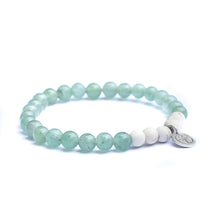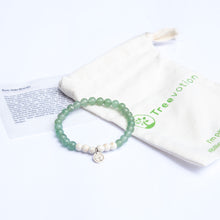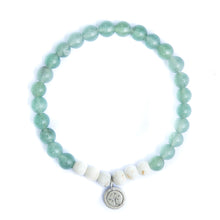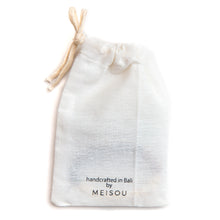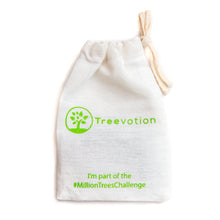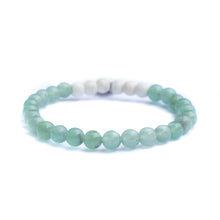




By purchasing this bracelet, you will plant 8 trees in the place you choose.
Genuine Bali Jade stone and Howlite stone from Ubud, in the island of Bali, Indonesia - Made by MEISOU Malas
- Elastic band
- 3 sizes
- Small: 6 inches / 15,2 cm
- Medium: 6,5 inches / 16,5 cm
- Large: 7 inches / 17,8 cm
- Unisex
- Includes vegan organic cotton bag
Plant 8 trees with this premium bracelet and choose where to plant them in the product options, you can make a dent in the most needed areas of the world :)
You will also receive an online certificate as a Treevotion Planter.
This bracelet supports local Balinese artisans with fair trade empowering women in Indonesia.
Materials: Jade Stone, Howlite and 925 Silver Pendant
From the depth of the mystic Balinese Heart, between the intense green palette that surrounds every breath and the sunlight that provides the forests nutrition to generate our precious and pure oxygen, the Jade stone represents that intense love felt in Ubud, Bali.
Jade attracts good luck and friendship. It stabilises the personality and promotes self-sufficiency. Soothes the mind, releasing negative thoughts. It has a soothing purity about it, and it goes about purifying your energy field in a manner that is accepting, loving, and wise. Opens the heart chakra, that is also green.
One obvious meaning of the jade stone is purity or purification. And because jade is regarded as a stone that protects and supports loving heart energy, jade also symbolizes gentleness and nourishment. For some users of jade, the stone may have the feeling of an ancient sage that is so centered that merely being in its presence creates a feeling of being elevated and nurtured.
In addition to the green jade is opaque howlite, a stone revered for its own balancing effects. Howlite supports good character, while dispelling negative qualities of criticism, anger and selfishness. Wear Bali Heart to help you get back to your heart, and bring out all of your best and most unique qualities. There is balance in darkness and light, allow it to shine through :)
You will plant 8 trees with this Bracelet!
To maximize the impact of your purchase, our partner will determine the most appropriate species of tree to plant.
Locations: Indonesia, Madagascar, Mozambique & Kenya
Indonesia: Made up of over 17,000 islands, Indonesia is one of the most biodiverse regions on the planet. These islands are home to 12% of the world’s mammals, 16% of the world’s reptiles and amphibians, 17% of the world’s birds and 25% of global fish populations. Among these 17,000 islands, there are 135 threatened mammal species, including the endangered Sumatran Tiger, Orangutans, the Javan Rhinoceros and Sumatran Elephants.
An estimated 40 million rural dwelling Indonesians rely heavily on the biodiversity of their environment for subsistence needs. Traditional fishermen rely on the wetland ecosystems all around the islands, including mangroves, coral reefs and sea grass for their livelihood. In the last 3 decades, Indonesia has lost over 40% of its mangrove forests, affecting not only the environment and the species that rely on them but also the communities that depend on this ecosystem for survival.
Treevotion and our partner Eden Reforestation Projects is working with local villagers on Biak Island to restore, replant, and protect these unique and vital forest systems.
To maximize the impact of your purchase, our partner will determine the most appropriate species of tree to plant.
Madagascar: Madagascar is more than just an island from an animated movie. It’s a nation with over 200,000 species of plants and animals that don’t exist anywhere else in the world. But more than 90% of Madagascar’s original forests have been destroyed, displacing entire animal species and taking away the Malagasy’s ability to farm and live on the land. Entire mangrove estuaries are gone, leaving the bare earth to wash away into the sea.
This project launched in 2007 by restoring ecologically devastated mangrove estuaries in the northwest of the country. Mangrove forests are essential ecosystems whose dense roots serve as an anchor for the soil and coastline preventing erosion and creating a barrier between harsh ocean systems and land. What began as primarily mangrove restoration and reforestation in 2007 grew to include a variety of native dry deciduous species in 2012. This will include two National Park systems, which aim to reforest and revive natural habitat for endangered and endemic animal species.
Mozambique: Mozambique is located on the eastern coast of Africa with 68% of its population living in rural parts of the country. This Eastern African country is home to 20 globally threatened bird species, and over 200 endemic mammal species. With over 45% of the population living beneath the poverty line, the population relies heavily on its natural resources and forests for survival.
Historically home to vast mangrove estuaries and forests, Mozambique’s mangroves have been largely decimated and destroyed. Treevotion and our planting partner Eden Reforestation Projects is working with local communities and villagers to restore, replant and protect these precious forest systems.
Kenya: Kenya is an incredibly beautiful place from the creativity of the people to its diversity of its landscapes and wildlife. From the highlands to the coast, Kenya has an incredible diversity of forest types that have long-supported communities and wildlife. The cultural and ecological heritage of Kenya’s forests is vibrant and unique, but the management of them in recent decades has been unsustainable.
Eden’s work around the world aims to alleviate poverty and restore socio-ecological systems through intensive reforestation work in a variety of forest habitats. From empowering women to sequestering carbon, the impact of the work is multifaceted. The need and enthusiasm for reforestation in Kenya is great. From the highlands to the coast, Kenya has an incredible diversity of forest types that have long-supported communities and wildlife. The cultural and ecological heritage of Kenya’s forests is vibrant and unique, but the management of them in recent decades has been unsustainable. Join us as we are working towards launching this work in The Great Rift Valley and the Northern Coast in Kenya!








